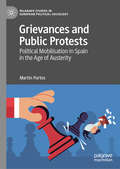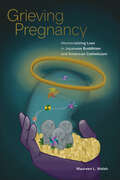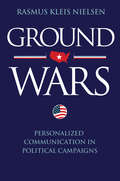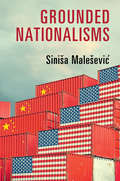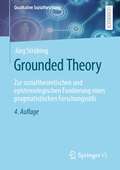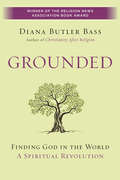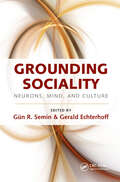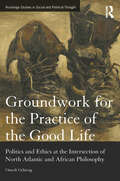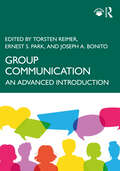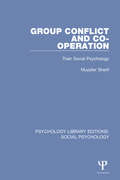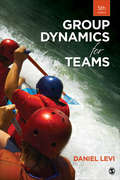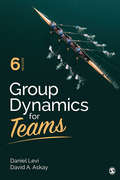- Table View
- List View
Grief: The Price of Love
by Svend BrinkmannWherever love and death meet there is grief. It affects us all regardless of ethnicity, age, class, or sexual orientation. Grief is universal – it has endured across time, societies and cultures from the earliest human communities to the present day. But the way we deal with grief is changing. Increasingly, we are diagnosing grief as a medical condition to be treated rather than embracing it as a natural part of being human. In this book, Svend Brinkmann gets to the heart of what it is to grieve, arguing that the sorrow we experience after the death of a loved one is a necessary and meaningful dimension of human existence. However painful, it unites us all. As humans we are uniquely privileged to feel grief. Rather than trying to escape or smother grief, we must allow ourselves to feel and accept it as the price we pay for love.
Grievances and Public Protests: Political Mobilisation in Spain in the Age of Austerity (Palgrave Studies in European Political Sociology)
by Martín PortosThis book sheds light on the role that grievances play for mobilisation dynamics in a context of material deprivation. Why do people protest? To what extent do grievances account for the varying size of protest events over time? Covering different levels of analysis, the author argues that effects of socioeconomic aspects (both objective-material deprivation and subjective-attitudinal grievances) are mediated by political attitudes, especially political dissatisfaction. He develops a framework to account for the dynamics, trajectory and timing of the cycle of contention that unfolded in Spain in the shadow of the Great Recession, contributing not only to the field of social movement studies but to our broader understanding of European politics, political sociology, political economy and economic sociology.
Grieving Pregnancy: Memorializing Loss in Japanese Buddhism and American Catholicism
by Maureen L. WalshIn Grieving Pregnancy: Memorializing Loss in Japanese Buddhism and American Catholicism, Maureen L. Walsh compares how the two religious traditions respond ritually and discursively to miscarriage, stillbirth, and abortion experiences marked by grief for the women involved. The experience of pregnancy loss has always been a part of women’s lives, yet only recently has it garnered attention from religious leaders and scholars commensurate with its prevalence. This book examines pregnancy loss as a theological problem for both Buddhism and Catholicism and analyzes the rites and memorials that have developed to address it, such as Japanese Buddhist mizuko kuyō (water children rites) and emergent American Catholic memorial practices focused on pregnancy loss. These parallel practices have emerged within distinct religious landscapes—a fact reflected in their forms and purposes—and when considered together, they raise questions of keen interest to theological and religious studies about the goals of religious practice and the imagination of human life at its earliest stages.
Gringo Injustice: Insider Perspectives on Police, Gangs, and Law
by Alfredo MirandéThe recent mass shooting of 22 innocent people in El Paso by a lone White gunman looking to "Kill Mexicans" is not new. It is part of a long, bloody history of anti-Latina/o violence in the United States. Gringo Injustice brings this history to life, shedding critical light on the complex relationship between Latinas/os and the United States’ legal and judicial system. Contributors with first-hand knowledge and experience, including former law enforcement officers, ex-gang members, attorneys, and community activists, share insider perspectives on the issues facing Latinas/os and initiate a critical dialogue on this neglected topic. Essays examine the unauthorized use of deadly force by police and patterned incidents of lynching, hate crimes, gang violence, and racial profiling. The book also highlights the hyper-criminalization of barrio youth and considers wide-ranging implications from the disproportionate imprisonment of Latinas/os. Gringo Injustice provides a comprehensive and powerful look into the Latina/o community’s fraught history with law enforcement and the American judicial system. It is an essential reference for students and scholars interested in intersections between crime and communities of Color, and for use in Sociology, Latino Studies, Ethnic Studies, Chicano Studies, Criminology, and Criminal Justice.
Grocery Story: The Promise Of Food Co-ops In The Age Of Grocery Giants
by Jon SteinmanHungry for change? Put the power of food co-ops on your plate and grow your local food economy. <p><p> Food has become ground-zero in our efforts to increase awareness of how our choices impact the world. Yet while we have begun to transform our communities and dinner plates, the most authoritative strand of the food web has received surprisingly little attention: the grocery store—the epicenter of our food-gathering ritual. <p> Through penetrating analysis and inspiring stories and examples of American and Canadian food co-ops, Grocery Story makes a compelling case for the transformation of the grocery store aisles as the emerging frontier in the local and good food movements. Author Jon Steinman: <p> Deconstructs the food retail sector and the shadows cast by corporate giants Makes the case for food co-ops as an alternative Shows how co-ops spur the creation of local food-based economies and enhance low-income food access. <p> Grocery Story is for everyone who eats. Whether you strive to eat more local and sustainable food, or are in support of community economic development, Grocery Story will leave you hungry to join the food co-op movement in your own community.
Groepsdynamiek en Teambuilding: Een handboek
by Hiriyappa BDit boek grijpt je naar de keel en gidst je naar het succes. Heb je je ooit afgevraagd hoe je een succesvolle professional kunt worden? Dit boek grijpt je naar de keel en brengt je naar het succes. Het bevestigt het beeld dat een team altijd slimmer is dan een individu. De methodiek in dit boek wordt gevolgd in simpel te volgen stappen zodat u altijd aan dit boek kunt refereren. Om het lezen makkelijker te maken worden de ideeen gepresenteerd door middel van opsommingen. Ik hoop dat je een succesvolle carriere zult hebben.
Groove Tube: Sixties Television and the Youth Rebellion
by Aniko BodroghkozyCritics often claim that prime-time television seemed immune--or even willfully blind--to the landmark upheavals rocking American society during the 1960s. Groove Tube is Aniko Bodroghkozy's rebuttal of this claim. Filled with entertaining and enlightening discussions of popular shows of the time--such as The Monkees, The Smothers Brothers Comedy Hour, The Mod Squad--this book challenges the assumption that TV programming failed to consider or engage with the decade's youth-lead societal changes. Bodroghkozy argues that, in order to woo an increasingly lucrative baby boomer audience, television had to appeal to the social and political values of a generation of young people who were enmeshed in the hippie counterculture, the antiwar movement, campus protests, urban guerilla action--in general, a culture of rebellion. She takes a close look at the compromises and negotiations that were involved in determining TV content, as well as the ideological difficulties producers and networks faced in attempting to appeal to a youthful cohort so disaffected from dominant institutions. While programs that featured narratives about hippies, draft resisters, or revolutionaries are examined under this lens, Groove Tube doesn't stop there: it also examines how the nation's rebellious youth responded to these representations. Bodroghkozy explains how, as members of the first "TV generation," some made sense of their societal disaffection in part through their childhood experience with this powerful new medium. Groove Tube will interest sociologists, American historians, students and scholars of television and media studies, and others who want to know more about the 1960s.
Ground Control: A Design History of Technical Lands and NASA’s Space Complex
by Jeffrey S. NesbitGround Control: A Design History of Technical Lands and NASA’s Space Complex explores the infrastructural history of the United States rocket launch complex. Working primarily between 1950, the year of the first rocket launch at Cape Canaveral, to 1969, the Apollo moon landing, the book highlights the evolution of its overlooked architecture and infrastructural landscape in parallel to US aerospace history. The cases outlined in this book survey the varying architectural histories and aesthetic motivations that helped produce America’s public image of early space exploration. The built environment of the U.S. space complex shows how its expanded infrastructural landscape tended to align with national Cold War politics and themes found in the age of modernity. Examples across often inaccessible sites of remote landscape help explain the contingent histories and deep association of an American aesthetic, land-use, and ultimately a form of nation-building practices. Ground Control offers a new way of understanding how technological uses of place-based science were designed and constructed in support of both industrial and military activities in postwar America. This book will be of interest to researchers, scholars, students, and anyone with a general interest in the history of American infrastructure, land use, and space exploration.
Ground Wars: Personalized Communication in Political Campaigns
by Rasmus Kleis NielsenPolitical campaigns today are won or lost in the so-called ground war--the strategic deployment of teams of staffers, volunteers, and paid part-timers who work the phones and canvass block by block, house by house, voter by voter. Ground Wars provides an in-depth ethnographic portrait of two such campaigns, New Jersey Democrat Linda Stender's and that of Democratic Congressman Jim Himes of Connecticut, who both ran for Congress in 2008. Rasmus Kleis Nielsen examines how American political operatives use "personalized political communication" to engage with the electorate, and weighs the implications of ground war tactics for how we understand political campaigns and what it means to participate in them. He shows how ground wars are waged using resources well beyond those of a given candidate and their staff. These include allied interest groups and civic associations, party-provided technical infrastructures that utilize large databases with detailed individual-level information for targeting voters, and armies of dedicated volunteers and paid part-timers. Nielsen challenges the notion that political communication in America must be tightly scripted, controlled, and conducted by a select coterie of professionals. Yet he also quashes the romantic idea that canvassing is a purer form of grassroots politics. In today's political ground wars, Nielsen demonstrates, even the most ordinary-seeming volunteer knocking at your door is backed up by high-tech targeting technologies and party expertise. Ground Wars reveals how personalized political communication is profoundly influencing electoral outcomes and transforming American democracy.
Grounded Nationalisms: A Sociological Analysis
by Siniša MaleševićGlobalisation is not the enemy of nationalism; instead, as this book shows, the two forces have developed together through modern history. <P><P>Malešević challenges dominant views which see nationalism as a declining social force. He explains why the recent escalations of populist nationalism throughout the world do not represent a social anomaly but are, in fact, a historical norm. <P><P>By focusing on ever-increasing organisational capacity, greater ideological penetration and networks of micro-solidarity, Malešević shows how and why nationalism has become deeply grounded in the everyday life of modern human beings. <P><P>The author explores the social dynamics of these grounded nationalisms via an analysis of varied contexts, from Ireland to the Balkans. His findings show that increased ideological diffusion and the rising coercive capacities of states and other organisations have enabled nationalism to expand and establish itself as the dominant operative ideology of modernity.
Grounded Theory: Zur sozialtheoretischen und epistemologischen Fundierung eines pragmatistischen Forschungsstils (Qualitative Sozialforschung)
by Jörg StrübingWenig wurde bislang über die erkenntnistheoretische Fundierung der Grounded Theory in der pragmatischen Sozialphilosophie und die daraus resultierenden Konsequenzen für das Verständnis der methodologischen Konzeption wie der praktischen Verfahren geschrieben. Der Band schließt diese Lücke, indem das Erkenntnismodell, ausgehend von den Arbeiten von C.S. Peirce, J. Dewey, G.H. Mead und W. James, vorgestellt und den Spuren nachgegangen wird, die dieses Modell als Geltungsbegründung in der Methodologie der Grounded Theory hinterlassen hat. Dabei geht der Text auch auf die gravierenden methodologischen Unterschiede zwischen der von Anselm L. Strauss geprägten und der von Barney G. Glaser vertretenen Variante von Grounded Theory ein und beschäftigt sich mit wesentlichen Weiterentwicklungen einer pragmatistischen Grounded Theory im Kontext postmodernen Denkens. Die vorliegende, vierte Auflage schließt zudem den aktuellen Diskurs um die Etablierung ansatzübergreifender Gütekriterien qualitativen Forschens an die Grounded Theory-immanenten Strategien zur Qualitätssicherung an. Forschende erhalten damit eine wertvolle Argumentationshilfe für die Legitimation ihrer empirischen Designs.
Grounded: Finding God in the World-A Spiritual Revolution
by Diana Butler BassThe headlines are clear: religion is on the decline in America as many people leave behind traditional religious practices. Diana Butler Bass, leading commentator on religion, politics, and culture, follows up her acclaimed book Christianity After Religion by arguing that what appears to be a decline actually signals a major transformation in how people understand and experience God. The distant God of conventional religion has given way to a more intimate sense of the sacred that is with us in the world. This shift, from a vertical understanding of God to a God found on the horizons of nature and human community, is at the heart of a spiritual revolution that surrounds us - and that is challenging not only religious institutions but political and social ones as well.Grounded explores this cultural turn as Bass unpacks how people are finding new spiritual ground by discovering and embracing God everywhere in the world around us--in the soil, the water, the sky, in our homes and neighborhoods, and in the global commons. Faith is no longer a matter of mountaintop experience or institutional practice; instead, people are connecting with God through the environment in which we live. Grounded guides readers through our contemporary spiritual habitat as it points out and pays attention to the ways in which people experience a God who animates creation and community.Bass brings her understanding of the latest research and studies and her deep knowledge of history and theology to Grounded. She cites news, trends, data, and pop culture, weaves in spiritual texts and ancient traditions, and pulls it all together through stories of her own and others' spiritual journeys. Grounded observes and reports a radical change in the way many people understand God and how they practice faith. In doing so, Bass invites readers to join this emerging spiritual revolution, find a revitalized expression of faith, and change the world.
Grounding Sociality: Neurons, Mind, and Culture
by Gün R. SeminThis volume concerns the longstanding intellectual puzzle of how individuals overcome their biological, neural, and mental finitude to achieve sociality. It explores how humans take each other into account, coordinate their actions, and are able to share their inner states and to communicate. Sophisticated views on the bases of sociality are detailed at the level of neural mechanisms, perception and memory, motivation, communication and dialog, culture, and evolution. These insights have been inspired by major strides and exciting new developments in disciplines as far afield as ethology, evolutionary ecology, neuroscience, cognition, memory, developmental and social psychology, psycholinguistics, philosophy, robotics, and sociology. The volume is the first to bridge these disciplinary boundaries to lay the foundations for an integrated and general conceptualization of the bases of sociality and its implications for psychology. Each contribution presents different levels of the grounding of sociality and will further stimulate novel approaches to linking different layers of sociality, from the neural to the cultural level.
Grounds for Difference
by Rogers BrubakerOffering fresh perspectives on perennial questions of ethnicity, race, nationalism, and religion, Rogers Brubaker analyzes three forces that shape the politics of diversity and multiculturalism today: inequality as a public concern, biology as an asserted basis of racial and ethnic difference, and religion as a key terrain of public contestation.
Groundwater Politics: Advanced Extractivism and Slow Resistance (Environmental Anthropology and Ethnobiology)
by Sally BabidgeThe mining industry is an expanding socio-ecological and political problem worldwide, not least in Atacameño-Likanantay (Indigenous) territories in the hyper-arid Salar de Atacama, Chile. Groundwater Politics addresses the social, technical and political conditions it calls ‘advanced extractivism’ to reveal how groundwater extraction sustains both ecological damage and mining economies. It richly describes the area's copper and lithium industries as historically linked with Indigenous communities and their ecological and economic futures. Based on over a decade of ethnographic research, the book casts community strategies to control water and territory as 'slow resistance’, the structural and multifaceted practices that generate a material future amid potential resource exhaustion.
Groundwater Sustainability: Conception, Development, and Application (Palgrave Studies in Environmental Sustainability)
by Robert E. MaceThis book will provide a comprehensive discussion of groundwater sustainability, including what it is, how its definition has changed over time, why traditional assessments of it are wrong, how assessments of it are ideally multidisciplinary efforts recognizing that policy is more controlling of outcomes than science, and why achieving it is difficult once pumping exceeds sustainable levels of pumping. The book will provide a nontechnical background of hydrogeology relevant to groundwater sustainability and present several case studies from around the United States and the world. The book has been designed to appeal to academics, students, and practitioners. Academics, particularly those just getting into the subject, will find the book a useful entry in terms of management concepts and political realities of attempting to achieve groundwater sustainability. It will also be useful to academics in that the book will include discussions on the history and development of groundwater sustainability and the practical aspects of aspiring to and achieving sustainable production. Although not a textbook, the book could be used as the basis for teaching a course or as a supplement to a hydrogeology or groundwater management class. Accordingly, the book will include questions and additional reading materials at the end of each chapter. This book will also be useful to practitioners through non-technical explanations of the sciences, discussions of the nuances of defining sustainability in aquifers, and the presentation of case studies where sustainable management has failed and succeeded.
Groundwork for the Practice of the Good Life: Politics and Ethics at the Intersection of North Atlantic and African Philosophy (Routledge Studies in Social and Political Thought)
by Omedi OchiengWhat makes for good societies and good lives in a global world? In this landmark work of political and ethical philosophy, Omedi Ochieng offers a radical reassessment of a millennia-old question. He does so by offering a stringent critique of both North Atlantic and African philosophical traditions, which he argues unfold visions of the good life that are characterized by idealism, moralism, and parochialism. But rather than simply opposing these flawed visions of the good life with his own set of alternative prescriptions, Ochieng argues that it is critically important to step back and understand the stakes of the question. Those stakes, he suggests, are to be found only through a social ontology – a comprehensive and in-depth account of the political, economic, and cultural structures that mark the boundaries and limits of life in the twenty-first century. It is only in light of this social ontology that Ochieng then proffers an alternative normative account of the good society and the good life – which he spells out as emergent from ecological embeddedness; social entanglement; embodied encounter; and aesthetic engenderment. At once sweeping and rigorous, incisive and subtle, original and revisionary, this book does more than just appeal to intellectuals and scholars across the humanities and social sciences – rather, it opens up the academic disciplines to a whole new landscape of exploration into the biggest and most pressing questions animating the human experience.
Group Communication: An Advanced Introduction
by Torsten Reimer Ernest S. Park Joseph A. BonitoIn this comprehensive, advanced introduction to group communication, the field’s leading experts summarize theory, methodological advancements, and current research in the field. This book follows a coherent structure specifying clear objectives and evidence-based practical implications for the management of groups. Each chapter provides case study examples highlighting the role of communication for group functioning. The textbook takes a particular look at recent advancements in the research on virtual teams, the role of technology in group communication, and issues of diversity and inclusion, considering group communication in various situations including health and organizational contexts. It features theory-driven descriptions, an emphasis on empirical findings, and reflections on research methods. The book is an integrative and coherent textbook for advanced undergraduate and graduate group communication classes and a useful reference for students, scholars, and group communication professionals across different disciplines including communication studies, psychology, life sciences, business administration, management, and engineering. Online resources include a sample course syllabus, discussion questions, lecture slides, and a test-bank. They are available at www.routledge.com/9781032114712
Group Conflict and Co-operation: Their Social Psychology (Psychology Library Editions: Social Psychology)
by Muzafer SherifOriginally published in 1966 the author challenges the accepted theories of group conflict of the time, such as frustration and maladjustment. For him conflict and its accompanying aggressiveness are features of interaction between groups and he supports this theory with a detailed experimental study of controlled groups. At the time of publication, Dr Otto Klineberg, Director of the International Centre for Intergroup Relations at the Sorbonne wrote: ‘Social scientists everywhere owe a great debt of gratitude to Professor Sherif. The distinguished series of publications for which he and his co-workers are responsible have an honoured place in our libraries. In particular, his contributions to the field of intergroup relations are outstanding; his concept of "superordinate goals", based on a combination of theoretical insight and brilliant experimentation, has become a household word for those concerned with this significant problem. In his new volume, Group Conflict and Co-operation, he carries his analysis much further, not only describing the results of several original investigations, but also building a theoretical appraisal of an extensive research literature. The author has made still another significant contribution toward a better understanding of one of the most complex and disturbing phenomena of our time.’
Group Dynamics (Mindtap Course List Series)
by Donelson R. ForsythGROUP DYNAMICS, 7th Edition, covers all major theories and topics pertaining to group and team processes. Focus on what's most important with clearly organized chapters and highlighted key points, and see how to apply concepts to actual groups through extended case studies -- one in every chapter. <p><p>The author draws on examples from a range of disciplines including psychology, management, law, education, sociology, and political science to help you develop a deeper understanding of each topic that you'll take with you beyond the classroom.
Group Dynamics for Teams: Levi, Group Dynamics For Teams
by Daniel J. LeviIncorporating the latest research throughout, Daniel Levi’s Fifth Edition of Group Dynamics for Teams explains the basic psychological concepts of group dynamics, focusing on their application with teams in the workplace. Grounded in psychology research and a practical focus on organizational behavior issues, this engaging book helps readers understand and more effectively participate in teams.
Group Dynamics for Teams: Levi, Group Dynamics For Teams 3e + Cobb, Leading Project Teams
by Daniel J. LeviIncorporating the latest research throughout, Daniel Levi’s Fifth Edition of Group Dynamics for Teams explains the basic psychological concepts of group dynamics, focusing on their application with teams in the workplace. Grounded in psychology research and a practical focus on organizational behavior issues, this engaging book helps readers understand and more effectively participate in teams.
Group Dynamics for Teams: Levi, Group Dynamics For Teams 3e + Cobb, Leading Project Teams
by Daniel J. Levi Dr. David A. AskayGrounded in psychology research but with a practical focus on organizational behavior issues, Group Dynamics for Teams helps readers understand and participate in teams more effectively in day-to-day work. Best-selling author Daniel Levi and new co-author David A. Askay thoroughly examine basic group dynamics concepts, such as goals, norms, cooperation, and communication, as well as review the main challenges that teams face, such as conflict, decision making, problem solving, creativity, and valuing diversity. Throughout the book are discussions of the organizational context of teams, including the impacts of organizational culture, virtual teamwork, rewarding teams, and team building.
Group Dynamics for Teams: Levi, Group Dynamics For Teams 3e + Cobb, Leading Project Teams
by Daniel J. Levi Dr. David A. AskayGrounded in psychology research but with a practical focus on organizational behavior issues, Group Dynamics for Teams helps readers understand and participate in teams more effectively in day-to-day work. Best-selling author Daniel Levi and new co-author David A. Askay thoroughly examine basic group dynamics concepts, such as goals, norms, cooperation, and communication, as well as review the main challenges that teams face, such as conflict, decision making, problem solving, creativity, and valuing diversity. Throughout the book are discussions of the organizational context of teams, including the impacts of organizational culture, virtual teamwork, rewarding teams, and team building.
Group Identity Fabrication Theory: A Communication-ecological Account with Social-theoretical Implications
by Robin KurillaTo date, there has been no comprehensive and coherent approach to determining the communicative and precommunicative processes involved in the construction of group identities. The present study fills this gap by developing a unified theoretical foundation that can be used to capture empirical construction processes. Moreover, it contributes to the domain of group communication research. It creates a basic theoretical riverbed that provides a conceptual foundation for the conception of inter- and intra-group communication, which does not take its starting point from 'objective' categories, but from de facto socialization processes. In addition, the architecture of an innovative social theory is presented using the example of the construction of group identity, which satisfies the demands of epistemological interests in communication studies and possibly also in other disciplines.

